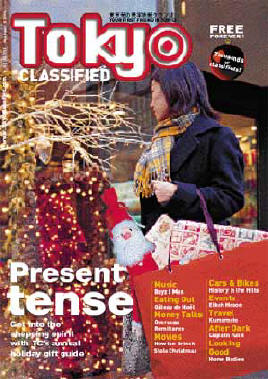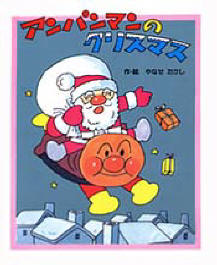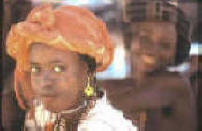Christmas in Japan
Here are
two short programs that were presented on National Public Radio (NPR) regarding
Christmas in Japan:
Japanese Christmas is more
Commercial
and Much Less a Family-Oriented
and Religious Affair
Eric
Weiner
Morning Edition
National Public Radio
December 23, 1999, Thursday
|
BOB EDWARDS, host:
In Japan, less than 2 percent of the
population is Christian, but that hasn't stopped the Japanese from
celebrating Christmas. It's the most popular unofficial holiday in Japan. In Tokyo, NPR's Eric Weiner
investigated Christmas Japanese-style.
ERIC WEINER reporting:
Strolling in Tokyo's Ginza district,
it's easy to forget that you're still in Japan. Just about every store
window has a Christmas display, there are Christmas trees lining the
streets.
We're going to go now and speak with a
couple of young Japanese women dressed as elves and selling cellular phones.
Let's see what they have to say.
|
 |
WEINER: 'We're trying to create the right
Christmas mood so people buy more things,' says Hitomi Fuji, adding that the
red and white elf hat keeps her ears warm. 'I wish I could wear it all the
time,' she says.
Make no mistake about it, Christmas in
Japan is a commercial extravaganza. But no one here pretends it is anything
else. As one harried shopper put it, 'Christmas has nothing to do with
religion.' It has everything to do with retail sales. No small matter in Japan
these days, the country is struggling to recover from its worst recession in
more than 40 years.
WEINER: This Ginza store is doing a
booming business selling all kinds of Christmas paraphernalia: overpriced
Christmas stockings, overpriced Christmas trees and one of the more popular items: the
Rock-a-Long Santa.
"SANTA": (singing) Have a holly-jolly
Christmas.
WEINER: It's a two-foot-high automated
Santa Claus doll that sways its hips side to side while belting out a country
Western version of this popular Christmas song. He comes in a variety of
outfits, including cowboy hat and Hawaiian shirt and retails for about $100.
But even Rock-a-Long Santa can't compete with homegrown Japanese icons. Takaow
Ishigima is the store manager.
Mr. TAKAOW ISHIGIMA: Yeah, most popular
item is this one. This name is Hello Kitty. Very famous in Japan, the cartoon
character.
WEINER: Cartoon characters of all kinds
are immensely popular in Japan and they've been popping up in many traditional
Christmas scenes. A giant penguin called Pindu pops out of a box, part of a
Christmas display in front of the Sony Building in Ginza. The Japanese began
celebrating Christmas decades ago, but it's been getting more popular and lavish
every year. In one Tokyo suburb, people have even begun decorating their homes
with Christmas lights, attracting curious onlookers from miles away.
But Christmas celebrations in Japan have
evolved a bit differently from those in the US. Instead of the traditional
Christmas turkey or ham, the Japanese prefer a bucket of KFC chicken, though no
one seems to know exactly how this custom came about. And among the best-selling
Christmas items here are condoms--yes, condoms. For the Japanese, Christmas is
not the time for a quiet family get-together; it's the time for a little
romance. Journalist Junko Takahashi explains.
Ms. JUNKO TAKAHASHI: Especially for the
couples. They go to the nice restaurant, have a special dinner and spend a
romantic night. So if you don't have a partner, it's kind of miserable night.
WEINER: So you don't spend Christmas with
your family?
Ms. TAKAHASHI: No. That's the most sad
thing, you know. Spend the Christmas night with your family?
WEINER: The Japanese do have a holiday
reserved for quiet family time. It's called New Year's Eve. Eric Weiner, NPR
News, Tokyo.
*
* *
* *
Christmas in Japan
Eric Weiner
Weekly Edition
National Public Radio
December 25, 1999
|
NEAL CONAN, host:
Christmas in Japan offers
temptations even more exotic than scrubby sponges. While the population is
less than 1 percent Christian, the celebration has taken the country by
storm, even if a few details have been lost in translation. We have a report
from NPR's Eric Weiner.
ERIC WEINER reporting:
Strolling in Tokyo's Ginza
district, it's easy to forget that you're still in Japan.
|

|
WEINER: Just about every store
window has a Christmas display. There are Christmas trees lining the streets.
We're going to go now and speak with
a couple of young Japanese women dressed as elves and selling cellular phones.
Let's see what they have to say.
Ms. HITOMI FUJI: (Japanese spoken)
WEINER: 'We're trying to create the
right Christmas mood so people buy more things,' says Hitomi Fuji, adding
that the red and white elf hat keeps her ears warm. 'I wish I could wear it all
the time,' she says.
Make no mistake about it, Christmas
in Japan is a commercial extravaganza. But no one here pretends it is anything
else. As one harried shopper put it, 'Christmas has nothing to do with
religion.' It has everything to do with retail sales. No small matter in Japan
these days, the country is struggling to recover from its worst recession in
more than 40 years.
WEINER: This Ginza store is doing a
booming business selling all kinds of Christmas paraphernalia: overpriced
Christmas stockings, overpriced Christmas trees and one of the more popular
items: the Rock-a-Long Santa.
"SANTA": (Singing) Have a
holly-jolly Christmas.
WEINER: It's a two-foot-high
automated Santa Claus doll that sways its hips side to side while belting out a
country Western version of this popular Christmas song. He comes in a variety of
outfits, including cowboy hat and Hawaiian shirt and retails for about $100.
But even Rock-a-Long Santa can't compete with homegrown Japanese icons. Takaow
Ishigima is the store manager.
Mr. TAKAOW ISHIGIMA: Yeah, most
popular item is this one. This name is Hello Kitty. Very famous in Japan, the
cartoon character.
WEINER: Cartoon characters of all
kinds are immensely popular in Japan and they've been popping up in many
traditional Christmas scenes. A giant penguin called Pindu pops out of a
box, part of a Christmas display in front of the Sony Building in Ginza. The
Japanese began celebrating Christmas decades ago, but it's been getting more
popular and lavish every year. In one Tokyo suburb, people have even begun
decorating their homes with Christmas lights, attracting curious onlookers from
miles away.
But Christmas celebrations in Japan
have evolved a bit differently from those in the US. Instead of the traditional
Christmas turkey or ham, the Japanese prefer a bucket of KFC chicken, though no
one seems to know exactly how this custom came about. And among the best-selling
Christmas items here are condoms--yes, condoms. For the Japanese, Christmas is
not the time for a quiet family get-together; it's the time for a little
romance. Journalist Junko Takahashi explains.
Ms. JUNKO TAKAHASHI: Especially for
the couples. They go to the nice restaurant, have a special dinner and spend a
romantic night. So if you don't have a partner, it's kind of miserable night.
WEINER: So you don't spend Christmas
with your family?
Ms. TAKAHASHI: No. That's the most
sad thing, you know. Spend the Christmas night with your family?
WEINER: The Japanese do have a
holiday reserved for quiet family time. It's called New Year's Eve.
*
* *
* *

Cultural Anthropology


